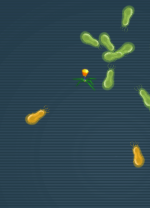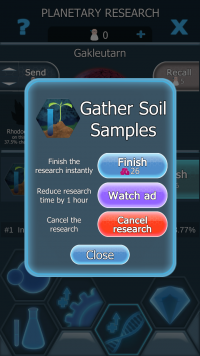Research
Research is a way of generating resources, earning and upgrading Evolved Bacteria, and improving Bacteria production.
Most research types require some amount of time to be completed and use Scientists, which are returned to the player after completion.
New research types can be unlocked by destroying planets.
Contents
Basics
Research Time
The base duration of a research action varies depending on the research type.
The research time can also be modified in various ways. The most notable one is upgrading your reduced research time stat, which will affect every action in the Research menu with the exception of Scientists travelling to and from planets. Other ways include paying Diamonds or watching ads to instantly complete one research action or completing Daily Quests and collecting Red Bacteria to reduce the remaining time for all active research actions.
Main page: Research Time
Cancelling Research
The option to cancel the research appears if you press and hold on an active research action.
Cancelling a research action will cause all the progress go to waste and return the Scientists to the player.
Research Types
There are seven research types, all of which are unlocked by Planet 9, the only exception being Bacteria Irradiation.
Bacteria Irradiation is unlocked only after 5 planets past the first Black Hole.
Bacteria Evolution
Bacteria Evolution is the first research available in the game. There are seven types of Bacteria Evolution, which are unlocked as you destroy more planets.
Each Bacteria Evolution research type has a chance to discover one Level 1 Evolved Bacteria. The droprates of different rarity Bacteria depend on the selected research type.
Only one type of Bacteria Evolution can be researched at a time.
Main page: Bacteria Evolution
Colony Irradiation
Colony irradiation is unlocked after destroying Earth.
Successful irradiation doubles the production of a random colony. Unsuccessful irradiation yields some Bacteria. One colony can be irradiated multiple times.
It is only possible to irradiate colonies that you have purchased at least once before. If every colony has been purchased at least once, then each colony has the same probability of being irradiated. Irradiation is capped to 400 for each colony.
The irradiation effect is not lost when entering a Black Hole or attacking a planet.
Only one irradiation type can be researched at a time.
| Success rate | Duration | Scientists | |
|---|---|---|---|

|
10% | 01:00:00 | |

|
30% | 06:00:00 | |

|
50% | 12:00:00 | |

|
75% | 24:00:00 | |

|
100% | 24:00:00 | |

|
70% | 08:00:00 | |

|
100% | 06:00:00 |
Main page: Colony Irradiation
Bacteria Mutations
The ability to mutate Evolved Bacteria is unlocked after destroying Mars.
Mutation requires two Bacteria of equal level and always gives one Bacteria of a higher level as a reward. The rarity of the mutated Bacteria is the same as the rarity of the used Bacteria. If they are of different rarities, the mutated Bacteria will have a random rarity in the same range, so it is not possible to obtain a higher rarity Bacteria through mutation.
Mutation is instantaneous and it requires no Scientists. However, after it is complete, the player has to clean the lab before it can be again used for mutations.
The default mutation cap is Level 3, which can be raised to Level 4 with the Ultimate Life Form tech at the Dark Matter Institute.
- When calculating the mutation results, the effects of Bacteria A and Bacteria B play an important role.
Mutating Bacteria with similar effects gives a better chance to obtain a good result.
Mutation results are calculated by taking the average values of Bacteria A and Bacteria B, so Bacteria with better effects usually give better results.
Even though higher level Bacteria generally have better effect, it is possible to mutate a Bacteria with weaker bonuses, especially if A and B are of different rarities.
In most cases, Bacteria C will have the effects as either Bacteria A or Bacteria B. The exception is when C has more stats than A and B individually.
The name of C is random and does not depend on Bacteria A and B.
See also: Evolved Bacteria
Main page: Bacteria Mutations
Nanobot Production
Nanobot production is unlocked after destroying 5 planets.

Only one Nanobot production type can be active at a time.
It's possible to instantly complete an active Nanobot production by paying some Diamonds.
The newly produced Nanobots appear on the main screen in real time. By clicking on a Nanobot, you gain an extra Nanobot for free, which is displayed as the Nanobot splitting into two yellow Nanobots.
The yellow Nanobots cannot be split any further.
Main page: Nanobots
Planetary Research
Planetary Research is a type of research that is unlocked after destroying six planets.
By sending a Scientist to the current planet, the player can gather soil samples that will give random bonuses until the current planet is destroyed. On certain planets, gathering soil samples also has a chance to yield Minerals that give permanent bonuses.
Soil samples can be gathered up to 5 times per planet and their effects are multiplicative.
After entering a Black Hole, the bonus from Planetary Research for the current planet is lost and the limit on gathering soil samples is reset.
In the Planetary Research Lab, only one action can be active at a time — either gathering soil samples or travelling to/from planets.
Main page: Planetary Research
Bacteria Recycling
Bacteria recycling lets you sacrifice unneeded Evolved Bacteria to obtain a random reward. It is unlocked after destroying the 9th planet - Xutrutis.
Upon recycling a Bacteria, 9 to 25 cards appear on the screen.
When a card is selected, it flips over, revealing the reward. After the first reward is received, the player can select up to one additional card from the remaining set by paying ![]() 5
5
The recycling rewards are divided into four tiers with each tier consisting of up to seven different rewards. The possible reward tiers and the number of cards displayed are determined by the bacteria value coefficient (BVC). The recycling rewards in events can be different from the regular game.
Bacteria Recycling is the only Research Lab that doesn't directly require Scientists.
Main page: Bacteria Recycling
Bacteria Irradiation
Bacteria irradiation is unlocked when the player has destroyed five planets after the first Black Hole.
Irradiation can increase the Black Hole Survival Probability of one selected Evolved Bacteria.
The default survival probability cap is 30%.
It can be raised to 100% by researching Hazard Elimination and other technologies at the Dark Matter Institute.
| Type | Effect | Duration | Scientists |
|---|---|---|---|
| Standard Dosage | 1:00:00 | ||
| High Dosage | 6:00:00 | ||
| Unstable Dosage | 3:00:00 | ||
| Overdosage | 2:00:00 |
Main page: Bacteria Irradiation


















